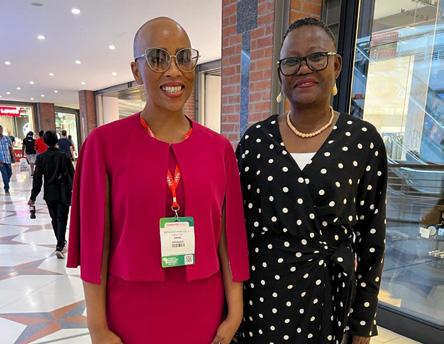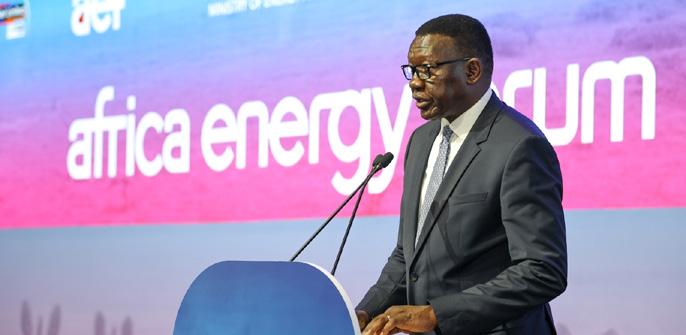
4 minute read
A SPOTLIGHT ON THE ROLE OF CLIMATE ADAPTATION IN AGRIBUSINESS
from theTradeEnvoy
As Africa shifts its energies towards net zero emissions targets, it needs to transition from a fossil fuelbased energy system to one that is renewable and ultimately more sustainable.
As nations worldwide aim to achieve net-zero emissions, Africa stands at the cusp of an energy transformation. The continent, rich in renewable energy resources and aspiring to diversify its economic sectors, is embarking on a transition from a fossil fuel-based energy system to one that is more sustainable and powered by renewable sources. The energy transition is not just about reducing carbon footprints but also encompasses a broad array of economic and social opportunities.
Advertisement
For Africa to capitalize on this transition, strategic investment and appropriate regulatory frameworks are necessary. The investment will foster innovation, infrastructural development, and skills transfer, while a conducive regulatory environment will encourage local and foreign investors to engage in renewable energy projects, driving the continent’s move towards netzero emissions.
Climate adaptation plays a critical role in this transition, particularly in sectors like agribusiness, which are key to Africa’s economy and food security. Agribusiness has the potential to become a driving force in the continent’s strive for net-zero emissions, through practices such as sustainable farming, climatesmart irrigation, and innovative value addition processes.
A case study that underscores this potential is Eric Onchonga’s venture, Irri-Hub Ke, in Kenya. The company provides climate-smart irrigation solutions and training for farmers, contributing towards climate change adaptation and promoting food security. It showcases the successful integration of climate adaptation strategies into agribusiness and the crucial role of such initiatives in Africa’s transition towards net-zero emissions.
Eric Onchonga: Kenyan Medical Laboratory Scientist in Agribusiness
• How did you get into agribusiness?
Coming from a background in Medical Laboratory Science, I have always held the belief that primary health care begins with diet and nutrition. I spent a brief period working in a medical laboratory before deciding to venture into agribusiness, which aligns more closely with my life’s mission and purpose. Growing up in Kenya’s sugar belt, I experienced firsthand the fluctuations in the annual sugarcane harvest as rainfall patterns changed and precipitation levels decreased. The dwindling farm yields and revenues resulted in most farmers struggling to afford balanced diets. Recognizing this, I saw solar irrigation as a viable solution to reduce the over-reliance on sugarcane, improve access to proper nutrition, and increase income from short-term high-value horticultural crops. Over time, I have replicated this model in other regions of the country, including areas that had barely practiced crop farming before.
• What agribusiness solutions do you offer?
At Irri-Hub Ke, we provide climatesmart irrigation solutions (products and services) aimed at enhancing farmer resilience amidst climate change. For rainwater harvesting,
We sell and install greenhouses and agricultural nets. Alongside our products, we provide farmer training on climate-smart irrigation and best agricultural practices such as zero tillage.

Eric Onchonga Kenyan Medical Laboratory Scientist in Agribusiness

Irri-Hub Ke offers damliners (geomembranes) for lining surface ponds, and solar pumps for extracting water from the reservoirs and storing it in an elevated tank. Our company also specializes in gravityfed drip irrigation systems. To reduce reliance on chemical inputs, we offer mulching paper that prevents weed growth and reduces evaporation rate. Additionally, we sell and install greenhouses and agricultural nets. Alongside our products, we provide farmer training on climate-smart irrigation and best agricultural practices such as zero tillage.
• What are the opportunities in agribusiness?
There are numerous untapped opportunities in Kenya and the wider African continent. We have a pressing need for value addition of perishable agricultural produce. This itself presents a green area ripe for innovation and impactdriven investment. Hydroponics and aquaponics are slowly gaining popularity, but there is a significant niche to be tapped in the training, installation, and maintenance of these systems. Innovators can also look into the production of regionspecific drought and pest-resistant seedlings. The installation of controlled environment structures such as smart greenhouses and storage facilities is another lucrative area in which aspiring agri-preneurs could thrive.

• What agribusiness challenges do you experience?
Like any other sector, the climatesmart irrigation sector comes with its own set of challenges. These include limited water resources and unreliable water supply, weak farmer organizations, a limited irrigation equipment supply chain and service market, high competition over water resources, and a lack of investment in extension marketing and logistics to reach more end users.

• What gaps exist that hamper climate adaptation?
The rate of climate change
While many people are aware of climate change, there is a low level of understanding of everyone’s roles in reducing greenhouse gas emissions and adapting to changes to improve the situation. Most households tend to take this issue lightly
Onchonga
adaptation in Kenya has been slowed by a low level of knowledge and risk awareness. While many people are aware of climate change, there is a low level of understanding of everyone’s roles in reducing greenhouse gas emissions and adapting to changes to improve the situation. Most households tend to take this issue lightly.
• What’s the place of climate adaptation towards a food secure society?
Climate change adaptation and food security are inseparable. Changes in climate reduce food quality and quantity and disrupt food availability. By building societal resilience through climate change adaptation, we directly contribute to food system security by increasing yield and achieving price stability.
• Is Kenya doing enough?
Climate change poses a significant risk to Kenya’s top revenue earners, agriculture and tourism. The nation has certainly been active in promoting climate change adaptation, as documented in the National Climate Change Action Plan (NCCAP), National Climate Change Response Strategy, and National Adaptation Plan (2015 – 2030). I would say, we are on the right path and we are making progress.










